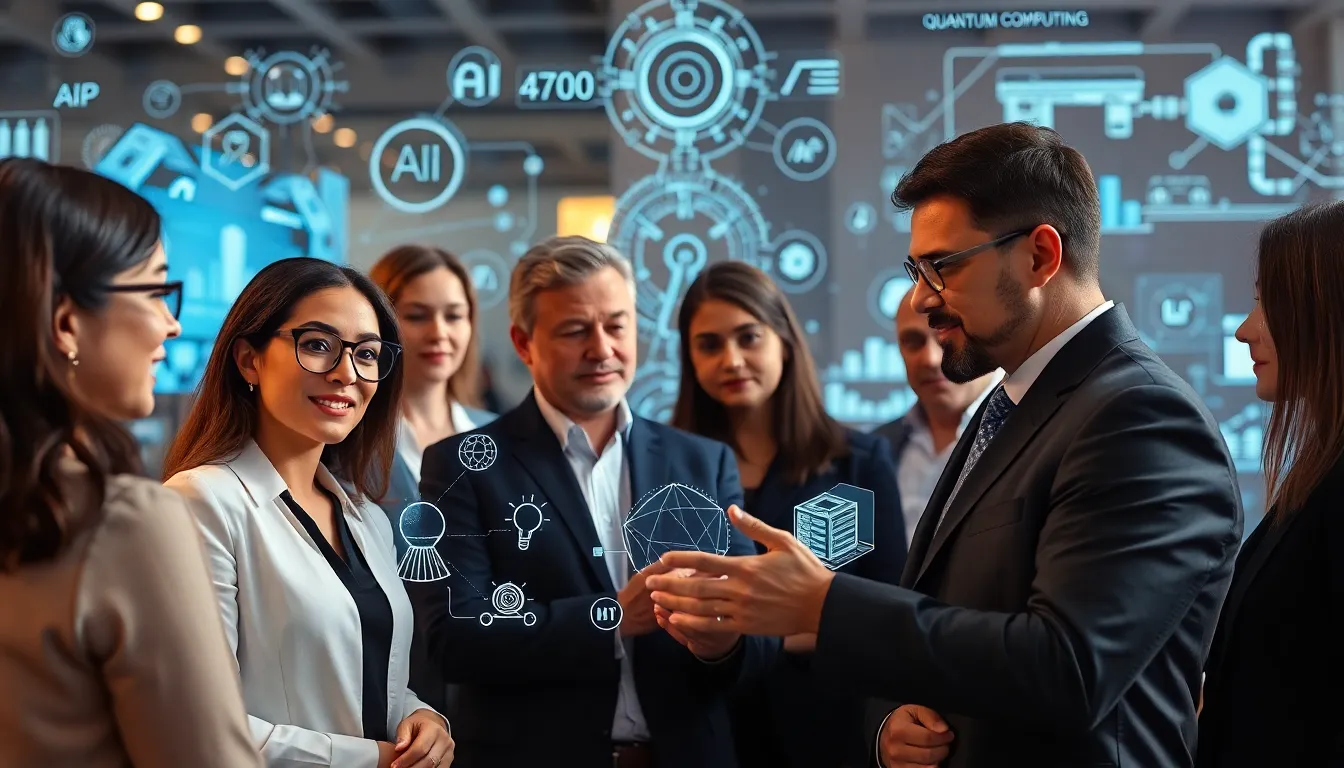Table of Contents
ToggleIn a world where smartphones are practically an appendage and smart fridges can judge your late-night snack choices, emerging technologies are shaking things up like never before. These innovations aren’t just for tech geeks anymore; they’re transforming everyday life in ways that make us wonder if we’re living in a sci-fi movie. From AI that can write poetry to robots that might soon be your new best friend, the future is looking pretty wild.
Overview of Emerging Technologies
Emerging technologies significantly influence daily life. Innovations reshape how people interact with their surroundings and each other. Artificial intelligence (AI) now writes poetry, creating unique experiences that blend creativity with technology. Robotics advances lead to the development of companion robots, enhancing social interaction and emotional support.
Smartphones and smart fridges represent just a fraction of this technological evolution. These devices integrate seamlessly into routines, offering convenience and efficiency. Augmented reality (AR) and virtual reality (VR) technologies transform entertainment and training experiences, immersing users in new and captivating environments.
Blockchain technology also gains traction, providing secure and transparent methods for transactions and data storage. Industries such as finance and healthcare adopt blockchain to increase trust and efficiency in operations. Internet of Things (IoT) devices further elevate smart living. Data from everyday objects enhances efficiency, leading to smarter homes and cities.
Quantum computing, while still developing, promises monumental advances in processing power. This technology can tackle complex problems faster than traditional computers, potentially revolutionizing fields like medicine and logistics. Each of these emerging technologies holds immense potential, influencing lives, industries, and economies worldwide.
Collectively, these advancements paint a picture of a tech-driven future where everyday activities face significant transformation. It’s crucial to consider both the benefits and challenges that accompany such rapid technological growth. Understanding these emerging technologies shapes the path toward a more connected and efficient world.
Types of Emerging Technologies

Emerging technologies shape industries and everyday life. They offer unique solutions across various domains, significantly enhancing capabilities and efficiency.
Artificial Intelligence
Artificial intelligence (AI) transforms diverse fields through automation and data analysis. It streamlines processes, enhances decision-making, and creates tailored user experiences. AI algorithms can analyze vast amounts of data quickly, leading to insights that drive innovation. Chatbots and virtual assistants improve customer service, making interactions more efficient and effective. Additionally, AI in healthcare enables predictive analytics for disease prevention and personalized treatments, ultimately improving patient outcomes.
Quantum Computing
Quantum computing revolutionizes computational power with its ability to process complex calculations at unprecedented speeds. By leveraging quantum bits or qubits, quantum computers can tackle problems considered unsolvable for classical computers. This technology holds promise for advancements in pharmaceuticals, cryptography, and materials science. Quantum algorithms can enhance optimization problems, leading to more efficient logistics and resource management. Its potential to transform industries signifies a shift towards solving intricate challenges in ways previously inconceivable.
Blockchain Technology
Blockchain technology enhances security and transparency across industries. It provides decentralized ledgers that securely record transactions, minimizing fraud risks. Financial services benefit significantly from blockchain by streamlining cross-border payments and reducing transaction costs. Supply chain management utilizes blockchain for traceability, ensuring products’ authenticity and origin verification. Moreover, the growing use of smart contracts automates agreements, decreasing the need for intermediaries. This technology paves the way for increased efficiency in data handling and transaction processes.
Impact of Emerging Technologies
Emerging technologies drive significant changes across various sectors. Their influence touches economic and social spheres, reshaping how individuals and organizations operate.
Economic Effects
Emerging technologies create new jobs and enhance productivity across industries. For instance, automation through AI streamlines manufacturing processes, leading to cost savings. Blockchain technology offers enhanced security for transactions, reducing fraud-related losses. Increased efficiency in supply chains results from IoT, contributing to overall economic growth. Investments in quantum computing promise breakthroughs that could transform fields like pharmaceuticals and logistics, directly impacting GDP. Balancing these advancements with ongoing workforce training proves essential to harnessing their full potential.
Social Changes
Social interactions evolve with emerging technologies playing a pivotal role. AI-driven social media platforms tailor content, influencing user engagement and shaping public opinion. AR and VR technologies reshape entertainment, offering immersive experiences in gaming and virtual events. Improved accessibility to information encourages informed civic participation and community engagement. Connected devices foster smarter living environments, enhancing health monitoring and personalized experiences. As the population adapts, these technologies prompt new discussions regarding privacy and ethical considerations, affecting governance and society at large.
Challenges and Considerations
Emerging technologies introduce various challenges that require careful consideration. Stakeholders must address both ethical implications and security concerns to navigate this evolving landscape.
Ethical Implications
Rapid advancements in technology bring about significant ethical implications. Algorithms used in AI systems can inadvertently perpetuate biases, leading to unfair treatment in areas like hiring or law enforcement. Developers must prioritize transparency to ensure that AI decisions remain interpretable. Moreover, questions arise regarding data privacy, as massive amounts of personal information are collected and analyzed. It’s crucial for organizations to create robust frameworks that protect individual rights. Responsible innovation necessitates ongoing discussions about consent and the societal impact of these technologies. Engaging diverse voices in these dialogues can help shape policies that align technological development with ethical standards.
Security Concerns
Security concerns pose a major challenge with the rise of emerging technologies. Cybersecurity threats become more sophisticated as automation and connectivity expand. Today’s IoT devices often lack adequate security measures, making them vulnerable to attacks. Organizations must adopt a proactive approach by implementing strong encryption protocols and conducting regular security assessments. Additionally, blockchain technology offers enhanced security features; its decentralized nature protects against fraud and data breaches. Incorporating these technologies effectively demands rigorous testing and continuous monitoring. As dependence on digital solutions grows, addressing security challenges remains a top priority for developers and users alike.
Future Trends in Emerging Technologies
AI is projected to evolve further, enhancing capabilities in areas such as machine learning and natural language processing. Innovations in healthcare present significant opportunities, as AI tools streamline diagnostics and personalized treatment plans. Quantum computing will drive breakthroughs, with firms increasingly investing in this technology to solve complex problems in drug discovery and climate modeling.
Blockchain technology continues to gain traction, particularly in finance and supply chain management. Its ability to enhance transactional security and transparency offers a more trustworthy framework for various industries. IoT devices are becoming more interconnected, leading to smarter cities and homes where energy efficiency is a top priority.
Additionally, AR and VR are expected to redefine user experiences across multiple sectors. The entertainment industry will increasingly adopt these technologies for immersive storytelling, while education will leverage AR for interactive learning environments. Automation in manufacturing is also expected to rise, highlighting AI’s role in improving productivity and efficiency on assembly lines.
Ethical considerations will remain vital as these technologies progress. More emphasis on developing unbiased algorithms will guide AI implementation, ensuring fairness in decision-making processes. Data privacy remains a significant concern; organizations will prioritize creating robust frameworks to safeguard user information.
Cybersecurity measures will enhance alongside the growing use of IoT devices. Adopting strong encryption techniques will protect against vulnerabilities, bolstering user confidence in these technologies. As they advance, understanding the potential impact and ethical implications of emerging technologies becomes essential for shaping a responsible and innovative future.
Emerging technologies are set to redefine the landscape of daily life and industries alike. As innovations like AI, quantum computing, and blockchain continue to evolve, they promise to enhance productivity and reshape interactions. The potential for smarter homes and cities through IoT is just the beginning of a transformative journey.
While these advancements bring exciting opportunities, they also necessitate a focus on ethical considerations and robust security measures. The balance between innovation and responsibility will be crucial in navigating this rapidly changing technological terrain. As society embraces these changes, understanding their implications will be vital for fostering an informed and equitable future.







